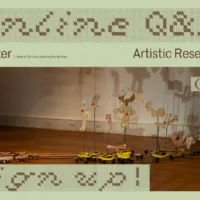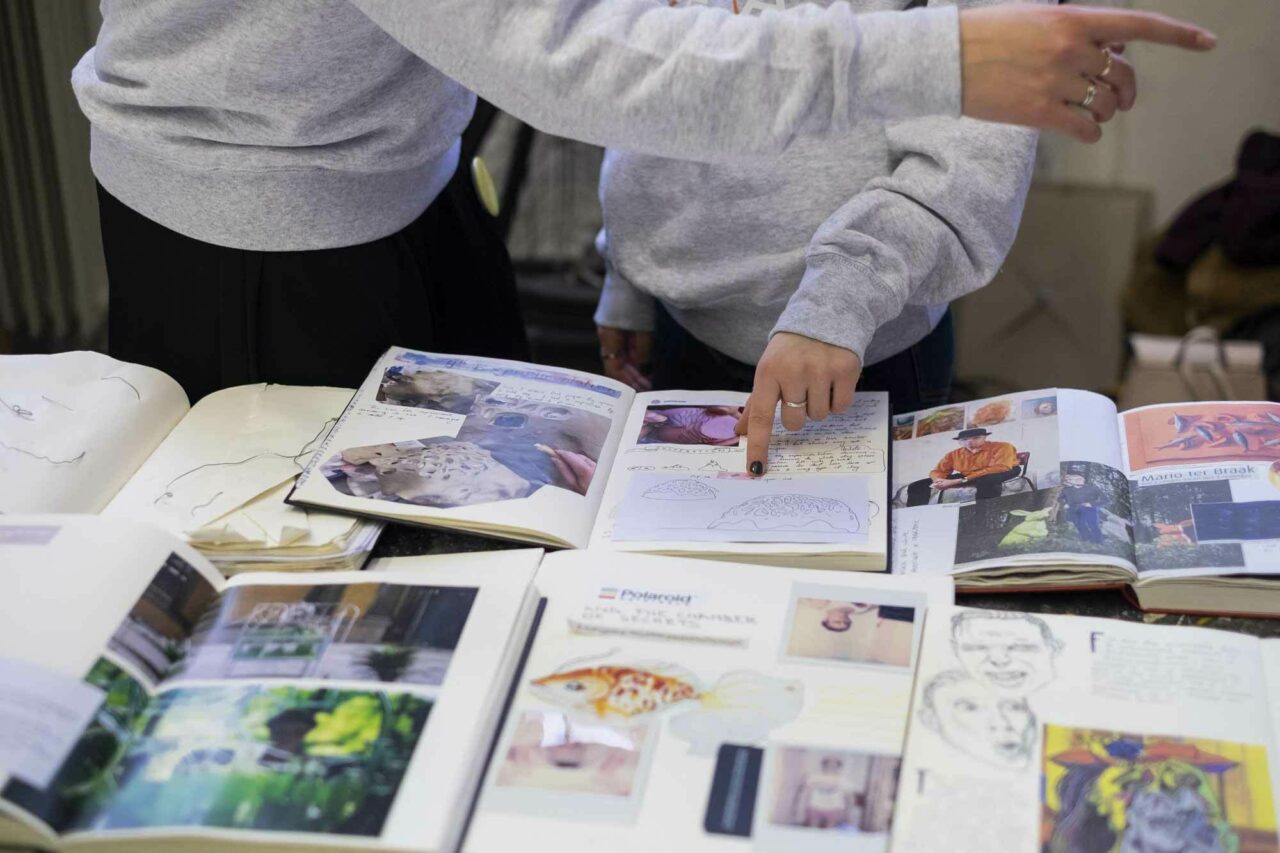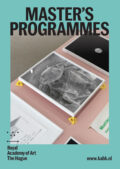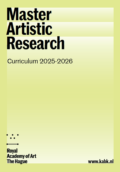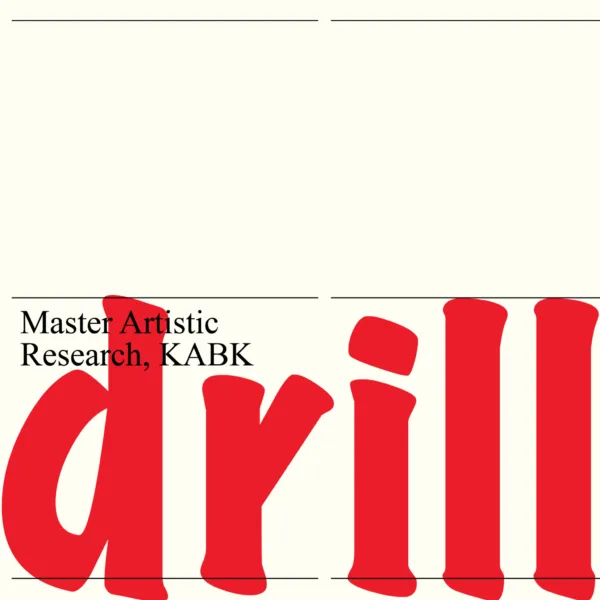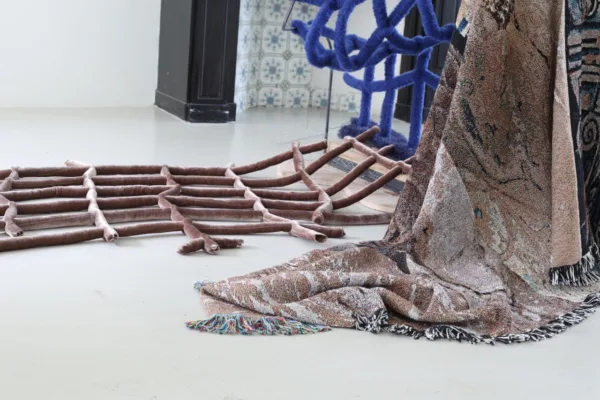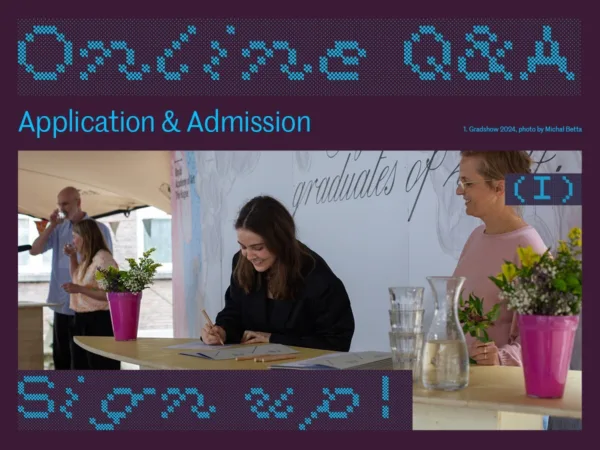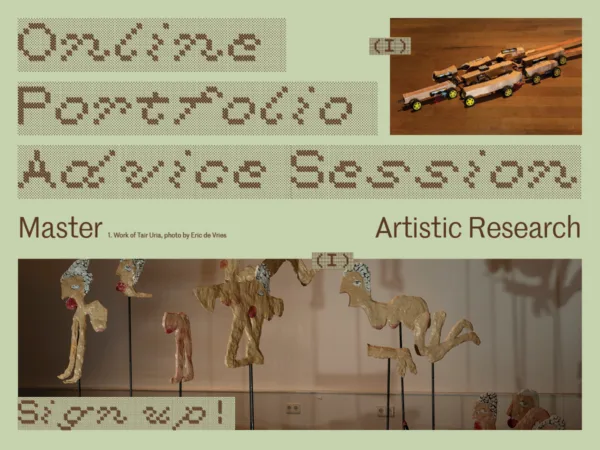Programme description
We begin each year by coming together as a research community. Year 1, year 2, and all teachers share their current projects and we map shared concerns. We also launch the previous semester’s publications, go on excursion and take time to eat together.
Year 1 and 2
The core work of the programme, across all four semesters, is your own study – practice-based research entwined with theory and writing classes. You have monthly meetings with tutors, attend the reading group and our Monday Research Days. These are filled with lectures and workshops given by guest artists, writers and other creative specialists.
Thesis
Your thesis is a 2-year project. In year 1, you develop a detailed plan related to your artistic interests. In year 2, you expand this into a 10,000 word thesis.
Annual exhibition and excursion
In 2025/2026, students will exhibit at Paradise. This is a gallery where early career artists are given the opportunity to present their work and develop their presentation skills. Paradise is a collaboration between West The Hague and the KABK.
Each year, we plan an excursion to a cultural centre within the EU.
Courses & ECTS credits 2024-2025
The Master Artistic Research programme amounts to 120 ECTS and lasts two academic years.
See below the curriculum overview for Years 1 and 2.
In the first year of the programme you orient yourself in the new environment and explore resources that you need. Emphasis is also on experimentation with new approaches to making and finding focus for your own artistic research trajectory.
| Courses Semester 1 | ECTS |
|---|---|
| Studio Based Research 1 | 14 |
| Theory and Writing 1 | 9 |
| Research Mondays 1 | 2 |
| We are a Research Community 1 | 1 |
| Excursion 1 | 1 |
| Professional Practice 1 | 2 |
| Hidden Ecologies | 1 |
| Total study points per semester | 30 |
| Courses Semester 2 | ECTS |
|---|---|
| Studio Based Research 2 | 12 |
| Theory and Writing 2 | 9 |
| Research Mondays 2 | 3 |
| Public Presentation of Work 1 | 3 |
| Publication Project 1 | 2 |
| Worlds in the Ethical Sense | 1 |
| Total study points per semester | 30 |
The second year of the programme provides a deep dive into your research questions. As you dig towards the core of your artistic interest, you will also realise and share your findings in a designed thesis and public presentation of artistic work.
| Courses Semester 1 | ECTS |
|---|---|
| Studio Based Research 3 | 10 |
| Theory and Writing 3 | 11 |
| Research Mondays 3 | 2 |
| We Are a Research Community 2 | 1 |
| Public Presentation of Work 2 | 3 |
| Excursion 2 | 1 |
| Professional Practice 2 | 1 |
| Hidden Ecologies 2 | 1 |
| Total study points per semester | 30 |
| Courses Semester 2 | ECTS |
|---|---|
| Studio Based Research 4 | 17 |
| Theory and Writing 4 | 7 |
| Research Mondays 4 | 3 |
| Professional Practice 3 | 1 |
| Publication Project 2 | 2 |
| Total study points per semester | 30 |
In the first year of the programme you orient yourself in the new environment and explore resources that you need. Emphasis is also on experimentation with new approaches to making and finding focus for your own artistic research trajectory.
Our approach to learning and assessment
The artistic work you make and present, the discussions you contribute to, and the writing you complete are the ways you will learn. The teaching that supports this progress towards an MA takes the following forms:
- Regular one-to-one tutorial support with both practice, theory and writing tutors.
- Group critiques, which are scheduled throughout your study.
- Group and individual training in text analysis and academic writing within the reading group.
- Discursive exposure to the work of visiting artists and other specialists. Critical feedback on your own work from these visitors.
- Exhibiting, as a finalising stage of research, is explored through public exhibitions.
- Cultural exposure. Well designed and targeted excursions.
- Assessments. At the end of each semester, your tutors will complete a written assessment of your progress. This will focus on the stated learning goals of the department and look back across the semester.
OER 2025-2026
Education and Examination Regulations
You can find information about the regulations and provisions dealing with the organisation of the programme and the assessments and examinations related to it in the Education and Examination Regulations (in Dutch: Onderwijs- en examenregeling; OER)
